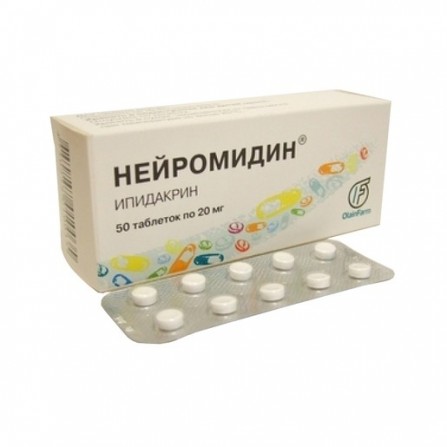More info
Active ingredients
Ipidacrine
Release form
Pills
Composition
Active ingredient: ipidacrine (ipidacrine) Active ingredient concentration (mg): 20
Pharmacological effect
Cholinesterase inhibitor. It has a direct stimulating effect on the conduction of the impulse along the nerve fibers, interneuronal and neuromuscular synapses of the peripheral and central nervous system. The pharmacological action of the drug Neuromidin is based on a combination of two mechanisms of action: blockade of the potassium channels of the neuronal membrane and muscle cells; reversible inhibition of cholinesterase in synapses. Neuromidin enhances the effect on smooth muscles not only of acetylcholine, but also of adrenaline, serotonin, histamine and oxytocin. Neuromidin has the following pharmacological effects: improves and stimulates the impulse in the nervous system and neuromuscular transmission; enhances the contractility of smooth muscle organs under the influence of agonists of acetylcholine, adrenaline, serotonin, histamine and oxytocin receptors, with the exception of potassium chloride; improves memory, inhibits the progressive development of dementia.
Pharmacokinetics
AbsorptionAfter ingestion, the drug is rapidly absorbed from the gastrointestinal tract. Cmax in the blood plasma is achieved after 1 h. Distribution Binding to plasma proteins is 40-50%. Ipidacrine rapidly enters the tissue, the half-distribution period is 40 min. Metabolism Ipidacrine is metabolized in the liver. Excretion is excreted by the kidneys, as well as extrarenally (through the digestive tract). Excretion by the kidneys occurs mainly by canalicular secretion and only 1/3 of the dose is excreted by glomerular filtration.
Indications
peripheral nervous system diseases: mono- and polyneuropathy, polyradiculopathy, myasthenia, myasthenic syndrome of various etiologies, diseases of the central nervous system: bulbar paralysis and paresis; the recovery period of organic lesions of the central nervous system, accompanied by motor and / or cognitive impairment, treatment and prevention of intestinal atony.
Contraindications
epilepsy; vestibular disorders; extrapyramidal diseases with hyperkinesis; angina pectoris; marked bradycardia; bronchial asthma; mechanical obstruction of the intestine or urinary tract; gastric ulcer or duodenal ulcer in phaseaggravations; pregnancy (the drug increases the tone of the uterus); lactation (breastfeeding); children and adolescents under 18 years of age (there are no systematic data on the application); hypersensitivity to the drug.
Precautionary measures
Do not exceed the recommended dose. With caution, use the drug for gastric ulcer and duodenal ulcer, thyrotoxicosis, cardiovascular diseases, in patients with obstructive diseases of the respiratory system in history or acute respiratory diseases, as well as for lactase deficiency, lactose intolerance, lactose / isomaltose malabsorption syndrome, since The preparation contains lactose.
Use during pregnancy and lactation
The drug is contraindicated during pregnancy and lactation (breastfeeding). The drug does not have a teratogenic, embryotoxic action.
Dosage and administration
Peripheral nervous system diseases: With mono- and polyneuropathy, polyradiculopathy of various etiologies - 10-20 mg (0.5-1 tab.) 1-3 times / day. The course of treatment is from 1 to 2 months. If necessary, the treatment can be repeated several times with a break between courses of 1-2 months. To prevent myasthenic crises, for severe disorders of neuromuscular conduction, 1-2 ml (15-30 mg) of a 1.5% Neuromidin solution is briefly parenterally administered, then treatment is continued, prescribing Neuromidin orally in the form of pills - the dose can be increased up to 20-40 mg (1-2 pills) 5 times a day. In diseases of the central nervous system: bulbar paralysis and paresis, the recovery period of organic lesions of the central nervous system (traumatic, vascular and another g eza) involving motor and / or cognitive disorders - 10-20 mg (0.5-1 tab) 2-3 times / day.. The course of treatment is from 2 to 6 months. If necessary, repeat the treatment. For treatment and prevention of intestinal atony - 20 mg (1 tab.) 2-3 times / day for 1-2 weeks. If the next dose was not taken on time, it should not be taken additionally. Maximum daily Dose - 200 mg.
Side effects
Reactions due to stimulation of m-cholinergic receptors: less than 10% - salivation, increased sweating, palpitations, nausea, diarrhea, jaundice, bradycardia, epigastric pain, increased secretion of bronchial secretions, bronchospasm, seizures.Salivation and bradycardia can be reduced by m-anticholinergics (atropine and others). When using the drug in high doses: less than 10% - dizziness, headache, chest pain, vomiting, general weakness, drowsiness, skin allergic reactions (itching, rash). In these cases, reduce the dose or briefly (1-2 days) interrupt the drug intake, increase the tone of the uterus, skin manifestations of allergic reactions
Overdose
Symptoms: decreased appetite, bronchospasm, lacrimation, sweating, pupillary constriction, nystagmus, increased peristalsis gastrointestinal tract, spontaneous defecation and urination, vomiting, jaundice, bradycardia, impaired intracardiac conduction, arrhythmias, reduction in blood pressure, anxiety, worry, agitation, anxiety, ataxia, convulsions, coma, speech disorders, drowsiness, and general weakness. Treatment: the use of m-anticholinergics (atropine, cyclodol, metacin and others), symptomatic therapy.
Interaction with other drugs
Neuromidin increases the sedative effect in combination with CNS depressant drugs. The drug's effects and side effects are enhanced when used together with other cholinesterase inhibitors and m-cholinomimetic agents. In patients with myasthenia, the risk of a cholinergic crisis is increased while other people use Neuromidin with other cholinergic agents. the risk of developing bradycardia, if beta-blockers were used prior to treatment with Neuromidin. The drug can be used in combination nootropic preparatami.Neyromidin attenuates inhibitory effect on neuromuscular transmission and carrying excitation of peripheral nerves local anesthetics, aminoglycosides, potassium chloride.
special instructions
During the period of treatment, the patient should exclude the use of alcohol. Alcohol enhances the side effects of the drug. Effect on the ability to drive vehicles and control mechanisms. During treatment, the patient should refrain from driving vehicles as well as practicing potentially hazardous activities that require increased concentration and psychomotor reactions.



